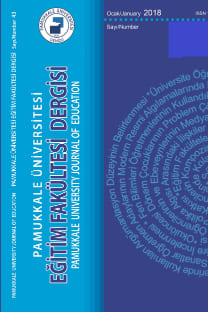Mesleki Gelişim Programının Fen Bilimleri Öğretmenlerinin Sınıf İçi Performansına Etkisi: Bilimin Doğası Öğretimi
bilimin doğası, pedagojik alan bilgisi, sınıf içi uygulama, profesyonel mesleki gelişim süreci, fen bilimleri öğretmeni
The Impact of a Professional Development Program on Science Teachers’ Classroom Performance: Teaching Nature of Science
professional development program, nature of science, pedagogical content knowledge, classroom practices, science teacher,
___
- Abd-El- Khalick F. ; Lederman N. G. (2000) ; The Influence of History of Science Courses on Students' Views ofNature of Science,The Influence of History of Science Courses on Students' Views of Nature of Science (Sf.1059-1063).
- Abd-El-Khalick F. , ; Bell R. L. ; ve Lederman N. G. (1997) ;The Nature Of Science and Instructional Practice: Making the unnaturel naturelJohn Wiley & Sons, Inc.
- Abd-El-Khalick F. ; BouJaoude S. (1997) ; An Exploratory Study Of The Knowledge Base For Science Teaching,Journal of Research ın Scıence Teaching, (Sf. 673-699).
- Abd-El-Khalick F. ; Lederman N. G. (2000); Improving Science teachers’conceptions of NOSAkerson V. L. ; Abd-El-Khalick F, ; Lederman N. G. (1999) ;The Influence of Explicit Nature of Science and Argumentation Instruction on Preservice Primary Teachers’ Views of Nature of Science
- Akerson V. L.;Hanuscın D.L.(2007); Teaching nature of science through inquiry: Results of a 3‐year professional development program
- Akerson, Valerie L.; Hanson, Deborah L.; ve Cullen ,Theresa A.(2007); The Influence of Guided Inquiry and Explicit Instruction on K–6 Teachers’ Views of Nature of Science, Journal of Science teacher education (sf.755-765).
- Dewey ,J.(1910). Science as subject matter and as method, Science,31(787),121-127.
- Doğan N ,Çakıroğlu J, Bilican K., ve Göngören Çavuş S.(2014), Bilimin Doğası ve Öğretimi, Ankara (Sf. 18-30).
- Dogan, N., Cakiroglu, J., Bilican, K., Cavus, S. (2013). What NOS teaching practices tell us : A case of two science teachers, Journal of Baltic Science Education, 12(4):424-439.
- Dogan, N, 2011. "What Went Wrong? Literature Students are more informed about the nature of science than science students", Education & Science, 36(159), 220-235.
- Dogan, N., Abd-El-Khalick, F. (2008). Turkish grade 10 students' and science teachers' conceptions of nature of science: A national study. Journal of Research in Science Teaching, 45(10), 1083–1112.
- Hanuscın D. L. ;Akerson V. L. (2011), Pedagogical content knowledge for teaching concepts of the nature of science.
- Herman B. C. ; Clough P. M. and Olson J. K. (2013) Teachers’ Nature of Science Implementation Practices 2–5 Years After Having Completed an Intensive Science Education Program,Science Teacher EducationDOI 10.1002/sce.21048.
- Kim S. B. ; Ko K. Eun. ; Lederman N. G.; Lederman J. S. (2005) ; A Developmental Continuum of Pedagogical Content Knowledge for Nature of Science Instruction.
- Korthagen, F. (2017) Inconvenient truths about teacher learning: towards professional development 3.0, Teachers and Teaching, 23(4), 387-405, DOI: 10.1080/13540602.2016.1211523.
- Lederman N. G. (1992) ; Students’ and Teachers’ Conceptions of the Nature of Science: A Review of the Research.
- Lederman N. G. (1998) ; Teachers’ Understanding of the Nature of Science and Classroom Practice:Factors That Facilitate or Impede the Relationship.
- Lederman, N. G. (2007). Nature of science: Past, present, and future. International Journal of Science Education, 23(8), 771-790.
- Mıhladız, G., & Doğan, A. (2010). Fen bilgisi öğretmen adaylarının bilimin doğası konusundaki pedagojik alan bilgilerinin araştırılması.Hacettepe Üniversitesi Eğitim Fakültesi Dergisi, (Sf.2-16).
- McDonald(2010); The Influence of Explicit Nature of Science and Argumentation Instruction on Preservice Primary Teachers’ Views of Nature of Science, Journal Of Research in Science Teaching (sf. 1137-1164).
- Milli Eğitim Bakanlığı Talim Terbiye Kurulu Başkanlığı, MEB (2005). İlköğretim Fen ve Teknoloji Dersi Öğretim Programı ve Kılavuzu, Ankara: Devlet Kitapları Müdürlüğü.
- Milli Eğitim Bakanlığı Talim Terbiye Kurulu Başkanlığı, MEB (2013). İlköğretim Kurumları Fen Bilimleri Dersi (3, 4, 5, 6, 7 ve 8. Sınıflar) Öğretim Programı, Ankara: Devlet Kitapları Müdürlüğü.
- Milli Eğitim Bakanlığı Talim Terbiye Kurulu Başkanlığı, MEB (2017). İlköğretim Kurumları Fen Bilimleri Dersi (3, 4, 5, 6, 7 ve 8. Sınıflar) Öğretim Programı, Ankara: Devlet Kitapları Müdürlüğü.
- Schwartz R.S., Lederman N., Crawford B.A (2003); Developing Views of Nature of Science in an Authentic Context: An Explicit Approach to Bridging the Gap Between Nature of Science and Scientific Inquiry, Developing views of NOS in anauthent context (Sf.611-617).
- Shulman,(1986),Those Who Understand: Knowlegde Growth in Teaching, Educational Researcher, ( sf.4-14).
- ISSN: 1301-0085
- Yayın Aralığı: Yılda 3 Sayı
- Başlangıç: 1996
- Yayıncı: -
Üniversite Öğrencilerinde Beden İmajı, Öz-Şefkat, Depresif Duygulanım ve Cinsiyet
Naci BAYRAK, Muammer ÇALIK, Salih DOĞAN
İlişki Doyumunun Mükemmeliyetçilik ve Güven Aracılığıyla Yordanması
Gözde ŞENSOY, Esra ASICI, Fatma Ebru İKİZ
Eğitim Fakültelerinin Misyonları Üzerine Bir Araştırma
Dilek DOĞAN, Mehmet Fatih YİĞİT, Arman ALIR, Ayça FİDAN, Özkan ÖZBAY, Hakan TÜZÜN
Gizem TEKİN, Nihal DOĞAN, Serhat İREZ, Yalçın YALAKİ, Gültekin ÇAKMAKÇI
Kariyer Araştırma Öz-yeterliğinin Çeşitli Değişkenler Açısından İncelenmesi
2005’ten 2018’e Ortaokul Matematik Dersi Öğretim Programlarının Değerlendirilmesi
Okul Müdürünün Kullandığı Motivasyonel Dil ile Öğretmenin Müdüre Duyduğu Bağlılık Arasındaki İlişki
Dijital Oyun Popüler mi? Ebeveynlerin Çocukları İçin Oyun Tercihlerinin İncelenmesi
